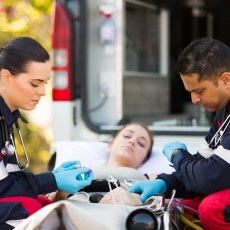
Shock happens when not enough blood and oxygen can get to your organs and tissues. It causes very low blood pressure and may be life-threatening. It often happens along with a serious injury.
There are several kinds of shock. Hypovolemic shock happens when you lose a lot of blood or fluids. Causes include internal or external bleeding, dehydration, burns, and severe vomiting and/or diarrhea. Septic shock is caused by infections in the bloodstream. A severe allergic reaction can cause anaphylactic shock. An insect bite or sting might cause it. Cardiogenic shock happens when the heart cannot pump blood effectively. This may happen after a heart attack. Neurogenic shock is caused by damage to the nervous system.
- Shock (National Library of Medicine)Shock happens when not enough blood and oxygen can get to your organs and tissues. It causes ... a serious injury. There are several kinds of shock. Hypovolemic shock happens when you lose a lot ...
- Anaphylaxis (National Library of Medicine)... pain or tightness Heart - weak pulse, passing out, shock Gastrointestinal tract - vomiting, diarrhea, cramps Nervous system - dizziness ...
- Electrical Injuries (National Library of Medicine)When you come in direct contact with electricity, it can pass through your body and cause injuries. These electrical injuries can be external or internal. ...
- Septic shock is a serious condition that occurs when a body-wide infection leads to dangerously low blood pressure. ... Septic shock occurs most often in the very old and the very young. It may also occur in people ...
- Sepsis (National Library of Medicine)... Severe cases of sepsis can lead to septic shock, where your blood pressure drops to a dangerous ...
- Toxic shock syndrome is a serious disease that involves fever, shock , and problems with several body organs. ... Toxic shock syndrome is caused by a toxin produced by some types of staphylococcus bacteria. A similar problem, called ...
- Cardiogenic shock takes place when the heart has been damaged so much that it is unable to supply enough ... electrical system of the heart (heart block) Cardiogenic shock occurs when the heart is unable to pump ...
- Hypovolemic shock is an emergency condition in which severe blood or other fluid loss makes the heart unable to ... enough blood to the body. This type of shock can cause many organs to stop working.
- Lithotripsy is a procedure that uses shock waves to break up stones in the kidney and parts of the ureter (tube that carries urine from your kidneys to your ...
- ... is having difficulty breathing. Take steps to prevent shock . Have the person lie flat, raise the person's ... arrest (no effective heartbeat) Respiratory arrest (no breathing) Shock



